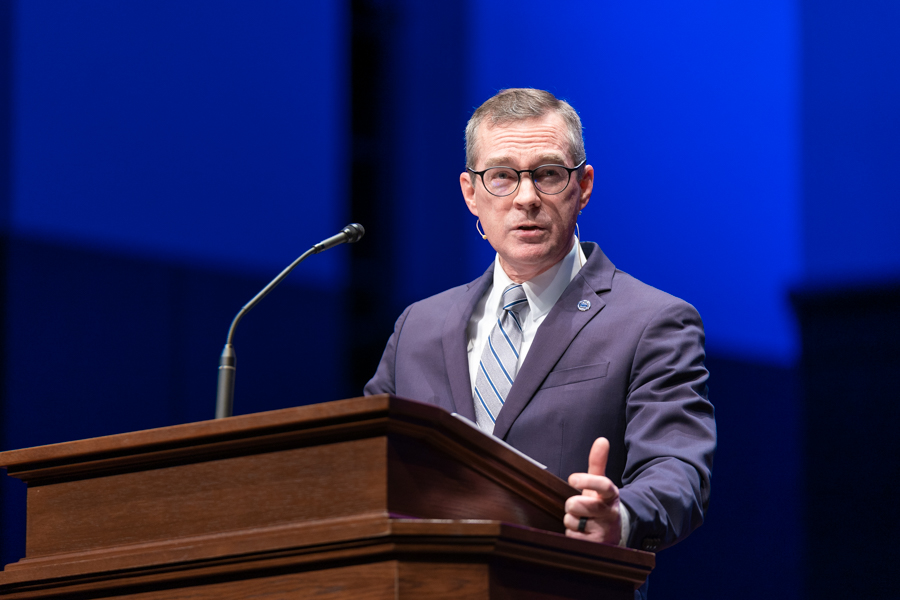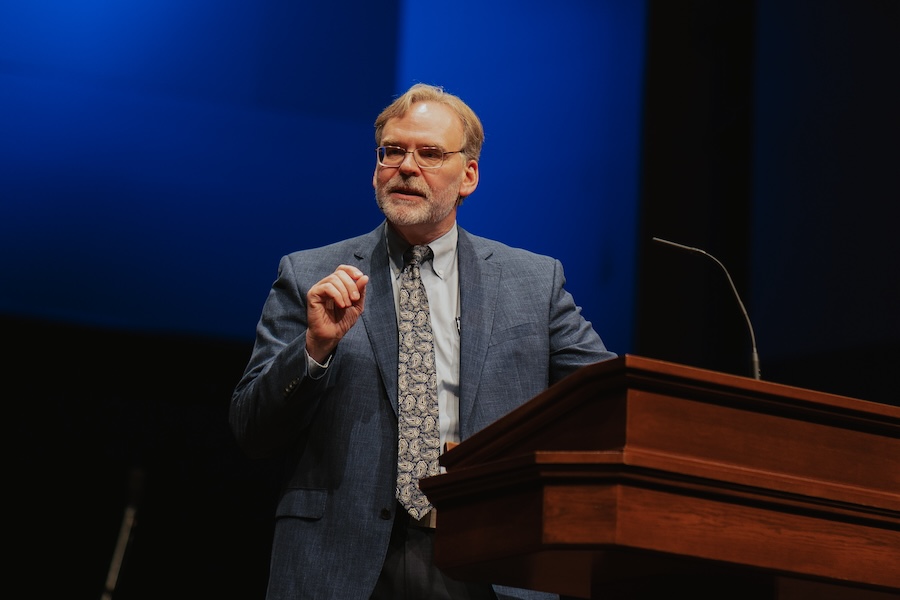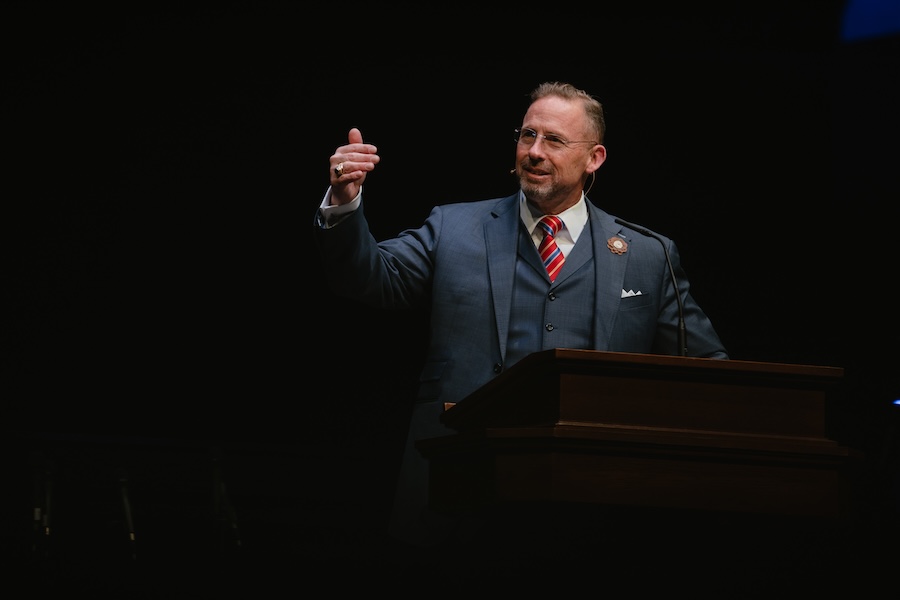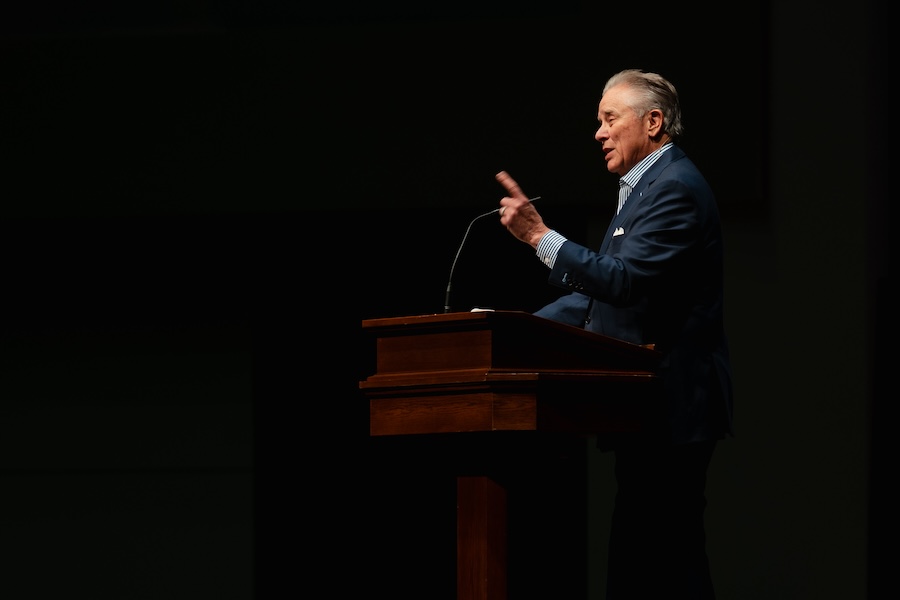Christ became the curse for believers, Wills preaches in chapel message


Believers are removed from the curse of the Law because Jesus made Himself the curse, Gregory A. Wills reminded Southwestern Baptist Theological Seminary and Texas Baptist College students, faculty, and staff in his Feb. 1 chapel message.
In his introduction of Wills, David S. Dockery, interim provost and vice president for academic administration, recognized the noted Baptist historian as “one of the best Baptist historians in the country today.” Wills began serving as dean of the School of Theology on Jan. 1, a post he also held at Southern Baptist Theological Seminary, the only person in Southern Baptist history to serve as School of Theology dean at two SBC seminaries, Dockery noted.
Wills directed the attention of the assembly to Galatians 3:9-14, which says that Christ redeemed believers from the curse of the Law by becoming a curse Himself, emphasizing that God justified the Gentiles by faith through the Abrahamic Covenant.
Providing context related to the passage, Wills explained that Paul began the text by confronting some Christians, known as Judaizers, in the early church who believed the Law was still in effect and that salvation came both through Christ, as well as through obedience to the Law of Moses, specifically though circumcision, clean and unclean foods, and observation of festivals.
Directing the assembly to the promises God made to Abraham throughout the Book of Genesis, Wills explained God made promises to Abraham that apply to his offspring and that Jesus Christ was the intended offspring of Abraham.
“To be a son of Abraham, then, is to be a son of God,” said Wills, noting that Galatians 3:26 and 29 remind believers that in Christ Jesus they are sons of God through faith, Abraham’s offspring, and heirs according to promise.
“Physical descent does not make you Abraham’s offspring, faith in Christ does,” Wills explained. “If you are Christ’s, you are Abraham’s offspring, heirs according to the promise. The blessings of Abraham come to sons of Abraham by union with Christ by faith in Him. So, then those who are of faith are blessed along with Abraham, the man of faith.”
Wills then described the “horrific” curse of the Law according to Deuteronomy 27 and 28, noting that God pledged judgment for Israel if they did not observe and obey everything written in the book of the Law. Disobedience, Wills observed, meant every aspect of their lives and any undertaking would be cursed through judgments including pestilence, drought, defeat at the hands of enemies, and being eaten by wild beasts. God also warned He would send upon them madness, blindness, and confusion.
Wills said the Law of Moses was a place of wrath and condemnation of sin, not redemption from sin, noting that in Isaiah 6:9-10 the curse of the Law dulled the hearts of the people, made their ears heavy, and their eyes blind. Noting the Law was not by or of faith, but of works, Wills reminded the gathering through Christ believers are saved by faith and salvation comes through faith.
The importance of this truth, Wills asserted, is highlighted when Paul confronted Peter’s hypocrisy by attempting to appease the Judaizers by forcing the Gentiles to live by Jewish laws.
“The Law of Moses came after the Abrahamic Covenant,” Wills said. “It does not annul the Abrahamic Covenant. It, rather, prepares the way for the fulfillment for the Abrahamic Covenant. It teaches, it prophesizes, it foreshadows the things to come. It teaches that faith saves, that a humble heart of faith and love toward God are what please God, not outward conformity.”
Wills observed the change in the role of the Law of Moses in light of Christ’s appearing.
“The Law of Moses reveals the glory of God, reaches the way of redemption through faith in Christ, reveals God’s holy character and universal moral obligations, but it does so in a different relationship once Christ comes,” Wills noted. “The law makes the hand-off to faith.”
Clarifying the hold the Law has on humanity, Wills stated that Christ redeemed Jews and Gentiles alike from the curse of the Law, noting that the Law did not only apply to Israel, but to all nations. He added that apart from faith, all of humanity is under the curse of the Law and the entire world is accountable to the curse of the Law, but Christ freed humanity by becoming the curse for mankind.
Wills concluded by reminding the assembly that believers can do nothing to secure acceptance with God.
“No work, no sacrifice, no humiliation, no obedience to God’s commands on your part can add an iota to what makes you acceptable to God,” Wills said. “You are loved and accepted because you are in Christ, not because you have done anything worthy of approval.”
In addition to leading the School of Theology, Wills serves as professor of church history and Baptist heritage. Prior to his service at Southwestern Seminary, he served at the Southern Baptist Theological Seminary, including as a professor of church history and School of Theology dean.
He has authored several books, including Democratic Religion: Freedom, Authority, and Church Discipline in the Baptist South, 1785-1900 and Southern Baptist Theological Seminary, 1859-2009, and he has contributed chapters and journal articles to various publications.
Wills’ entire message can be viewed here.
Chapel is held every Tuesday and Thursday morning at 10 a.m. (CT) in MacGorman Chapel on the campus of Southwestern Baptist Theological Seminary. Chapel may be viewed live at swbts.edu/live.



